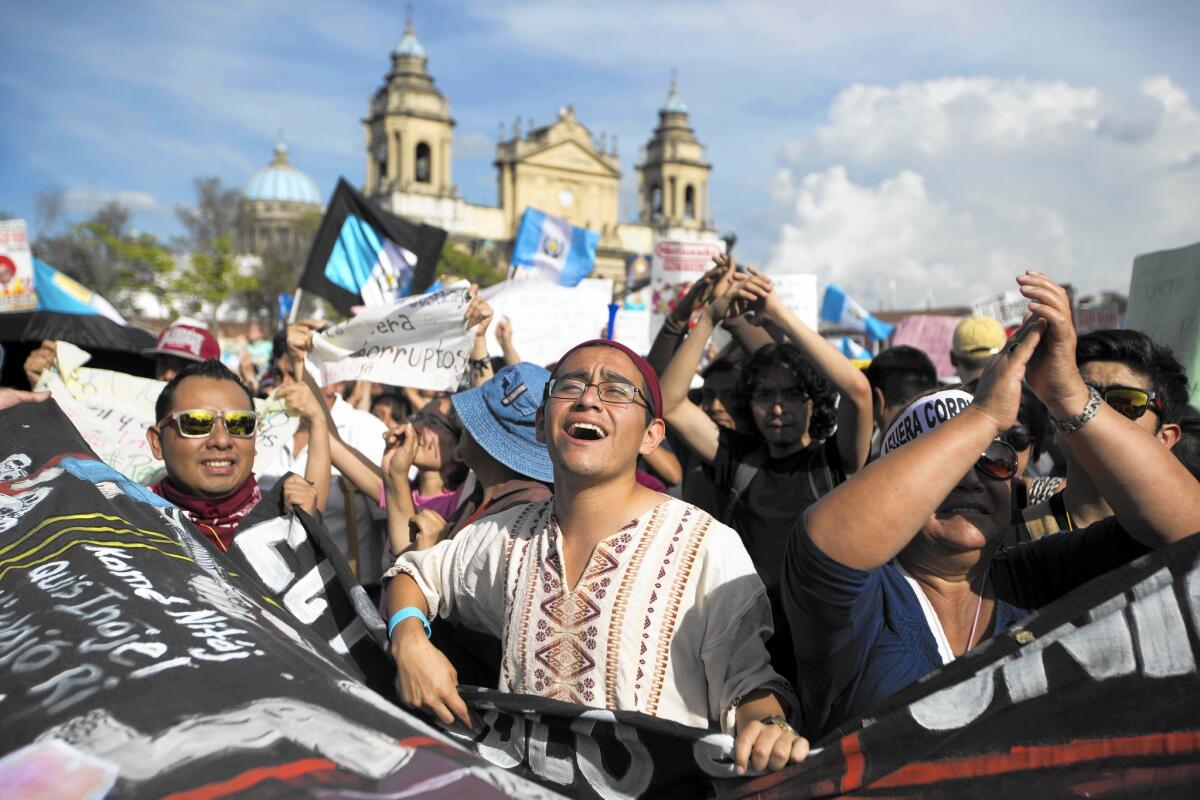Scandals in Guatemala, Honduras threaten to further destabilize region

- Share via
Reporting from MEXICO CITY — Two Central American presidents, both favored allies of the U.S., are facing corruption scandals threatening to undermine their governments and further erode stability in the volatile region that is a principal source for illegal immigration to the United States.
Large protest marches over the weekend have illustrated the precarious status of Presidents Juan Orlando Hernandez of Honduras and Otto Perez Molina of Guatemala. In Guatemala City, that country’s capital, all types of demonstrators, from dissidents to elite businessmen, filled the main square in anger. In the Honduran capital, Tegucigalpa, the mostly leftist opposition staged a dramatic torchlight procession.
The common demand: resignation of the president.
The greatest pressure is on Perez Molina, who has been struggling to get ahead of twin scandals that have forced the ouster of his vice president, several Cabinet ministers, the head of the intelligence agency and a former central bank president, among others.
“Kleptocracy, criminal mafias, drug cartels and the rotten leadership of our military and civilian security forces have transformed Guatemala into a repugnant, squalid latrine,” Jose Ruben Zamora, editor of the Guatemalan newspaper elPeriodico, said in an open letter to the public, urging protesters to take the streets. “We are obliged, together, with courage and unflagging energy, to expel the dense, fecal waters that inundate us.”
The suspected criminal wrongdoing that brought down Vice President Roxana Baldetti involved accusations of customs fraud at the Guatemalan trade authority that oversees exports and imports. According to investigations by a United Nations commission on transparency, working with the Guatemala attorney general’s office, top officials at the trade authority lowered customs fees for numerous businesses in exchange for millions of dollars in bribes.
About 20 officials have been arrested, and investigators alleged that Baldetti’s personal secretary, Juan Carlos Monzon, was the mastermind behind the scheme. He remains at large. Baldetti has denied involvement but stepped down last month as Congress weighed whether to revoke her immunity from prosecution.
Perez Molina may have hoped her removal would turn down the heat. But additional investigations turned up another scandal that may have caused deaths. Top officials of the Social Security Institute were suspected of paying inflated prices to a Mexican pharmaceutical firm in exchange for sizable kickbacks. Among the equipment was kidney dialysis machinery that investigators said was defective and may have led to the deaths of 15 people.
The Supreme Court is reviewing whether to lift Perez Molina’s immunity from prosecution.
Meanwhile, in Honduras, Hernandez is fighting accusations by opposition politicians that his political party used $90 million belonging to the national Social Security Institute to finance its last election campaign. Hernandez, who won that election, has angrily denied the accusations, and the party is threatening to sue those making them.
State prosecutors, however, have said they are investigating the misuse of Social Security funds that might be tied to Hernandez’s National Party or other political organizations. An estimated $300 million may have been siphoned off, investigators say.
On Monday, Hernandez announced what he described as a major crackdown on “the criminal and the corrupt,” including officials. But he did not give details. The day before, the prosecutor who had led the investigation into the Social Security malfeasance, Roberto Ramirez, left Honduras to take a diplomatic posting. He said he had asked to be relieved of his role in the case because of “highly” credible threats to his life, the newspaper El Heraldo reported.
The Social Security case “lifted the veil that had been hiding how disfigured the face of justice is” in Honduras, scholar Edmundo Orellano wrote in Monday’s edition of La Tribuna. But, he predicted, Honduran institutions are too weak to make much headway in rooting out corruption.
In Guatemala, investigations are having more success thanks largely to the U.N. group, known as the Commission Against Impunity; the U.N. presence in Guatemala is a holdover from the organization’s critical role in helping to end that country’s civil war.
Guatemala and, especially, Honduras are impoverished nations with extremely high rates of crime and violence, and with weak democratic systems. Honduran elites ousted the country’s president in a 2009 coup, the first such action in Latin America in decades.
With El Salvador, the two countries account for the bulk of Latin American migrants attempting to reach the United States — even outpacing Mexico — and for nearly all the unaccompanied minors whose numbers swelled last year.
The Obama administration has requested $1 billion for Central America as aid for security and poverty programs. And a U.S. Marine rapid-response squad numbering about 250 is scheduled to be deployed to Central America this month and based primarily in Honduras.
More to Read
Sign up for Essential California
The most important California stories and recommendations in your inbox every morning.
You may occasionally receive promotional content from the Los Angeles Times.











